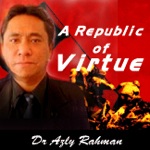Instead of plagiarising, teach critical thinking

Critical thinking is also not about running in the streets screaming for this or that change; it is a process of intellectual embodiment and the democratisation of one's personal understanding of the intellectual basis of change.
Azly Rahman http://azlyrahman-illuminations.blogspot.com
Knowledge which is acquired under compulsion obtains no hold on the mind. – Plato
I once taught Thinking Skills, Foreign Policy, and Ethics. My approach towards Teaching Thinking was about increasing the capacity of the mind to explore newer perspectives, make critical judgment, and envision a scenario of a society of peace and justice, based on the principles of multiculturalism.
I value such an experience and have grown with it. We need to create and nurture a culture of thinking in a world that is increasing hostile to radical and ethical ideas.
In my teaching, the approach combines universal ethical values, creativity, critical thinking and problem solving, and futuristics. I think there is value in such an approach.
If we can radicalise student thinking, teach them to stand for their rights, give them choices in thinking, have them articulate great ideas in their own words, we can make them better graduates.
We can train them to become good ethical revolutioners that will remove oppressive and corrupt leaders and redesign a society that will continue to rejuvenate itself.
We can teach them to punish polluters – especially corporations that dump poison into our rivers or puff deadly smoke into our environment. We can teach them to demand the resignation of corrupt leaders – or even have an entire cabinet resign. We can create socially-conscious futurists out of our children.
Futurists conjure scenarios of societies they want to have – build from the ruins of one that has crumbled out of the need for greed and economic speed. Radical futurists conjure newer social order reconstructed out of the ruins of the ones ruled by leaders addicted to raw power; power employed to rape the environment and humanity these leaders are entrusted to "govern".
But first we must have the teachers/lecturers prepare for all these as well. We have many bright and young academics eager to explore newer perspectives in politics, economic and cultural aspects of our world. Can they do these in a cognitively-controlled environment? How do we help them?
Critical thinking is not 'criticising'
It seems that there is a deeper meaning to "critical thinking" than just "criticising" something or anything.
It is a process of the personal evolution of metacognition (beyond cognition itself); to understand one's own thinking process and to govern it with the tools one acquire through interacting with the environment and processing information that will become meaningful through the complex neural connections made in the brain.
There has to be a good repertoire of knowledge in one's brain/mind/consciousness in order to understand the "dialectical and dialogical" aspect of thinking.
Our education system must encourage this development through the love of reading – the exploration of good and great books taught by teachers who love books and have the passion to challenge students to think and think. Thinking must be encouraged; students must live their daily lives in classrooms without fear of being punished or ridiculed for thinking critically and creatively.
Our classrooms must encourage dialogues and debates even if the subject matter is sensitive difficult, painful, and intellectually challenging. We must have good teachers to groom student to become brave thinkers and communicator of ideas. These teachers/professors themselves must embody the virtues of radical thinking and become beacons of hope for newer thinkers, much like what Socrates was to the Athenians in 5th Century B. C.
Radical thinkers must be celebrated and honored, not imprisoned and shamed. Only a shameless government doing shameful acts would jail good, ethical, socially-conscious thinkers who speak truth to power.
If in our universities, thinking means thinking about what the state dictates and students are being punished for speaking out on issues that concern their role as future inheritors of their society, we have a got a national problem.
Higher order thinking
The essence of higher order thinking skills is the "WHY" question and the "WHAT IF" and "WHY NOT THIS" … these brings our students to critique dominant paradigm and allow them to conjure newer perspectives, much like what radical social futurists would do.
What is the culture of critical thinking in our Malaysian classrooms these days? Is it enabling the culture of thinking or retarding it?
Critical thinking is also not about running in the streets screaming for this or that change; it is a process of intellectual embodiment and the democratisation of one's personal understanding of the intellectual basis of change.
It is a process of constructing a "republic of virtue" in which each citizen is a philosopher-ruler in his/her own right. Each individual perhaps like the notion held by the Buddhist, is "aware" of the surrounding, mastering his/her own environment, aware of cause and effects of beingness, to identify oppressive signs and symbols that govern him/her and others, to destroy structures that are shacking, to essentially be able to look at his/her life like a crystal-ball.
Is this idea of creating world-wise radical intellectual and movers and shakers possible in our Malaysian educational system?
This is the greatest challenge of this century, for our nation especially. If we wish to remove the Internal Security Act, radically revise the Universities and University Colleges Act, and remove all Acts that are anathema to a healthy thinking culture, we must rethink how we think.
We owe a good education system to our children – a system that will teach children to systematically revolt against systems.
OUR USUAL REMINDER, FOLKS:
While the opinion in the article is mine,
the comments are yours;
present them rationally and ethically.
AND — ABOLISH THE ISA — NOW!

